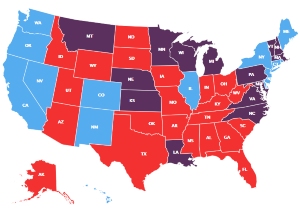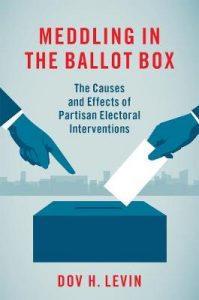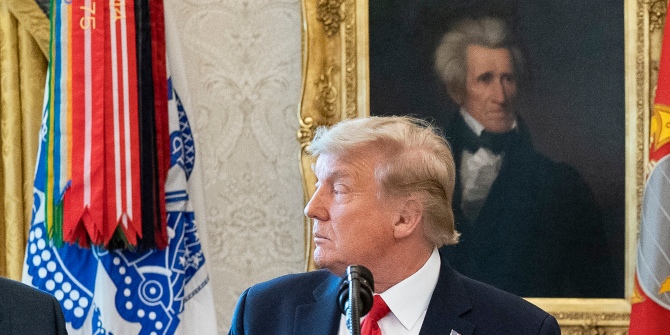USAPP Managing Editor, Chris Gilson looks at the best of the week’s political blogging from academics and think-tanks. Don’t see a blog referenced here that you think we should be reading? Let us know what we’ve missed out and we’ll try to include it next week.
Jump to
The Trump Administration and the Republican Party
On Saturday, Outside the Beltway comments that it seems like “45” (Donald Trump) isn’t clear about just how government works, after he tweeted to sat that the Russian ambassador, who met former Senator (and now Attorney General) Jeff Sessions, also visited President Obama’s White House 22 times. Such ambassadorial visits are nothing unusual. Trump was trying to take attention away from the recent controversy over Sessions meeting with the ambassador after he had stated that he had had no such contacts. Speaking of Trump and Russia, Mischiefs of Faction this week maps the Trump-Russia network, visualizing known and possible connections between him, his team and Russian business and government.
FiveThirtyEight this week writes on what they say are the “eight power centers” or “wings” of the Trump administration: Steve Bannon, Mike Pence, John McCain, “friends and family”, the Party, Wall Street, the bureaucrats, and the “other important figures”.
On Sunday, Lawfare has ten new questions for Donald Trump in the wake of his accusations that former President Obama authorized the wiretapping of Trump Tower during the 2016 election. These include if Trump can agree that “FBI, DOJ, and the FISA Court are now at liberty to confirm the existence of any FISA surveillance that may have been taking place at Trump Tower or against its occupants”, and “which agencies, if any, did you consult before declassifying presumably sensitive material about a foreign counterintelligence investigation”? Epic Journey reports that the Director of the FBI, James Comey, has “called BS” on Trump’s accusations about Obama’s alleged wiretapping, commenting that Comey has stated that the claim is “false and must be corrected”.
On Monday, ImmigrationProfBlog writes that in a new survey, more than 200 economists have stated that Trump’s policies on immigration, NAFTA, and how the handle the US’ debt, are wrong. This week also saw President Trump sign a new executive order on refugees and immigrants. Lawfare summarizes the order; the main differences from the January order are that it no longer includes Iraq, does not affect foreign nationals with valid visas, eliminates the preference for religious minorities, and authorizes officials to waive the temporary refugee restriction. The Volokh Conspiracy says that the new travel ban is still cruel and still unconstitutional, inflicting “cruel harm” on refugees and others, with little security benefit. They comment that the new order is clearly another outgrowth of Trump’s “Muslim ban” comments, and as such is likely to be ruled as being unconstitutional by the courts. On Wednesday, ImmigrationProfBlog reports that the State of Hawaii has filed a joint motion with the government outlining that it will file a complaint against the measure, with oral arguments to be held on March 15.
Turning to the Republican Party, Lawyers, Guns & Money writes on Sunday that the GOP were always going to collaborate with President Trump, referring to the party establishment taking Trump’s claims about President Obama seriously. They comment that the GOP followed Trump when he was running for office; they’ll definitely do so now that he can help them to deliver upper class tax cuts.
This week saw the House GOP release their repeal and replace bill for Obamacare, the American Health Care Act, which was almost immediately criticized by the House Freedom Caucus and others in the Party like Ann Coulter (American Power), as well as conservative and libertarian health care experts (The Volokh Conspiracy). FiveThirtyEight says that it’s so hard for the GOP to agree on health care because the ideological range within the Party has grown so large. Monkey Cage, meanwhile, says that Republicans are struggling over Obamacare because they must use “reconciliation” (a legislative move which only needs 50 Senate votes and therefore avoids the filibuster) to get their replacement through.
The Democratic Party
On Thursday, Lawyers, Guns & Money is amazed that many socialists still oppose electoral politics – citing the feelings of many on the liberal left who are unhappy that Bernie Sanders was not able to win the Democratic nomination last year. They say that leftists have a choice: they can either be serious about making change via electoral politics, or embrace irrelevancy.
The House and Senate
On Monday, Outside the Beltway wonders if the Republican Party are serious about governing, citing the “utter ineptitude of Republican leadership in Congress”, which has spent seven years promising alternatives to Obamacare, and has come up with a seemingly inadequate one now. Angry Bear, meanwhile riffs on The Who, writing that “no-one know what it’s like to be Paul Ryan”, with no-one liking his health care reform proposals.
Elections and American democracy
On Tuesday, Smart Politics wonders which 1st term US Senator will lose their seat in 2018. They say out of the 13 “true-first term” US Senators up for election, Arizona Republican Jeff Flake, and Democrat Tim Kaine of Virginia should both be worried.
FiveThirtyEight comments this week that “Purple America” has now all but disappeared: counties are becoming more and more uncompetitive as communities become more polarized politically.
On Thursday, The Society’ Pages Clippings looks at the Trump presidency and the rise of political activism, writing that unprecedented numbers of people on the left are mobilizing, bringing many newcomers to the political scene.
The Government, Beltway and the Supreme Court
On Sunday, Beat the Press discusses a recent estimate that the cost of complying with federal rules is nearly $2 trillion. They say that what the cost really represents is the cost of not imposing cots on others – such as the Clean Air Act and smoking bans.
Lawyers, Guns & Money reports that a new lawsuit is claiming that tens of thousands of immigrants detained by US Immigration and Customs Enforcement were forced to work for $1 a day, or for nothing, a practice which would violate federal anti-slavery laws.
Lawfare writes that the CIA had a “no god, very bad, totally awful Tuesday”. Why? Wikileaks released a large number of documents which revealed that the CIA hack people, documents which were able to be compromised in the first place.
Turning to the courts, The Volokh Conspiracy has the news that in a recent case, Supreme Court Justice Clarence Thomas sharply criticized civil forfeiture laws. While the statement is within a refusal to hear the case, it signals that at least one justice will be sympathetic to such arguments in the future. Outside the Beltway says that SCOTUS has refused to hear another case – this time it’s an appeal for a case involving a transgender teenager in Virginia who sued his school district to allow him to use the bathroom of the gender that he identifies with, rather than that of his birth. The ruling follows the Trump administration’s revocation of the Obama administration’s previous guidance that a lower court had used to rule in the teen’s favor. On Monday, Immigration Prof Blog reports that the Supreme Court has ruled that a man who had been convicted of sexual offenses will be tried again after two jurors in the case told the man’s lawyers that another had made racist remarks against the man and his main witness.
Foreign policy, defense and trade
On Tuesday, Political Violence @ A Glance looks at how President Trump will likely wage war, writing that it is difficult to discern a coherent military strategy from him , given statements that he would like to “bomb the hell out of ISIS” but send “very few troops” into the Middle East. They write that there are some early indications that Trump will be more accepting of foreign policy risks, supplementing unmanned strikes with manned missions. Speaking of “boots on the ground”, American Power has the news that US Marines have landed in Syria in order to provide artillery support in the fight against Islamic State in Raqqa.
Two Weeks Notice talks on Cuban human rights and the Trump administration, writing that the US State Department’s new report on the subject is very similar to the one from last year. This suggests that the administration may not be anticipating a more confrontational policy with Cuba, given the lack of a human rights rationale.
Russia has been in the news a great deal of late, mostly to do with its alleged interference in the US presidential election last year. But, Russia is actually less threatening than it seems, writes Monkey Cage: its economy is weak, it’s facing a demographic crisis, and it can no longer afford to buy off troubled regions and maintain its level of military spending.
Obamacare and health policy
The big news in health care policy this week was of course the Republican Party’s introduction of the Affordable Health Care Act (AHCA). Outside the Beltway writes Tuesday that the plan “leaves much to be desired”, given that it phases out Obamacare’s expansion of Medicaid by 2020 and replaces subsidized premiums with tax credits, which will do little to help the poor. Beat the Press says that, with their plan, the GOP are looking to top the 50 million Americans who were without health insurance prior to the introduction of the Affordable Care Act. Lawyers, Guns & Money meanwhile comments that Obamacare’s individual mandate is being replaced by a penalty for non-compliance which increases costs by 30 percent if their coverage lapses for more than 63 days. FiveThirtyEight discusses whether or not the GOP health bill has a chance, commenting that it may be middle of the road enough to do so. On Thursday, Epic Journey rounds up a list of more than 25 organizations who oppose “Trumpcare”, from the AARP to the United Methodist Church.
The economy, society and criminal justice
Outside the Beltway writes this week that Donald Trump’s economic ignorance is now costing the US jobs by withdrawing from trade deals such as the Trans Pacific Partnership.
Marginal Revolution takes on recent comments from Bill Gates that robots should be taxed. They argue that main issue with such taxation is where the incidence will fall; would businesses abandon robots in favor of labor, which would then boost wages? Monkey Cage, meanwhile, says that robots are not killing the American Dream, and neither is trade.
On Monday, The Volokh Conspiracy addresses comments from Housing and Urban Development Secretary, Ben Carson that classified African slaves brought to North America as “immigrants”. They say that such a clarification is not an uncommon one in academic discussions. On Thursday, Lawyers, Guns & Money writes that we are seeing the return of a racist union, in the form of the United Brotherhood of Carpenters who are now tipping off undocumented workers to the authorities.
Finally, FiveThirtyEight examines the real “liberal media bubble” that may have blinded so many to the possibility that Donald Trump might actually win the 2016 election.
Featured image: Harrisburg, PA – 20170120-182409 by Paul Weaver is licensed under CC BY NC SA 2.0.
Please read our comments policy before commenting.
Note: This article gives the views of the author, and not the position of USAPP– American Politics and Policy, nor of the London School of Economics.
Shortened URL for this post: http://bit.ly/2nMtbqK
















